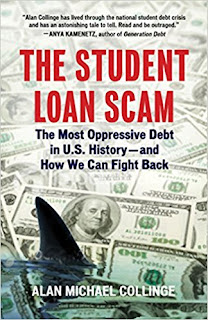The Student Loan Scam is an exposé of the predatory nature of the $85-billion student loan industry. In this in-depth exploration, Collinge argues that student loans have become the most profitable, uncompetitive, and oppressive type of debt in American history.
This has occurred in large part due to federal legislation passed since the mid-1990s that removed standard consumer protections from student loans-and allowed for massive penalties and draconian wealth-extraction mechanisms to collect this inflated debt. High school graduates can no longer put themselves through college for a few thousand dollars in loan debt. Today, the average undergraduate borrower leaves school with more than $20,000 in student loans, and for graduate students the average is a whopping $42,000. For the past twenty years, college tuition has increased at more than double the rate of inflation, with the cost largely shifting to student debt.
Collinge covers the history of student loans, the rise of Sallie Mae, and how universities have profited at the expense of students. The book includes candid and compelling stories from people across the country about how both nonprofit and for-profit student loan companies, aided by poor legislation, have shattered their lives-and livelihoods. With nearly 5 million defaulted loans, this crisis is growing to epic proportions.
The Student Loan Scam takes an unflinching look at this unprecedented and pressing problem, while exposing the powerful organizations and individuals who caused it to happen. Ultimately, Collinge argues for the return of standard consumer protections for student loans, among other pragmatic solutions, in this clarion call for social action.
*Think credit-card debt is a problem? Take a look at the lives ruined through the corporate thug tactics, usurious fees and vicious harassment employed by some of the nation's largest student-loan providers in this shocking exposé from Collinge, founder of StudentLoanJustice.org. The author had a manageable $38,000 in loans—until he missed a single payment. Fees and charges quickly piled up, and his debt mushroomed to more than $100,000. The author reveals that since lenders make far more money from defaulted loans than they do from borrowers in good standing, they go to extraordinary—and illegal—lengths to force borrowers into default. There are currently more than five million defaulted loans on record, and incredibly, student loans are the only type of loan in U.S. history to be nondischargable in bankruptcy. The author exposes the engineers (and profiteers) of this predatory system and urges Congress to restore standard consumer protections to student loans, concluding with a call to arms for progressive changes, refinancing rights and a plethora of practical advice for borrowers. Comprehensive and stirring, this extraordinary book is whistle-blowing at its finest. (Feb.)
Copyright © Reed Business Information, a division of Reed Elsevier Inc. All rights reserved. --This text refers to an out of print or unavailable edition of this title.
*Collinge is a writer and political activist committed to convincing Congress to restore standard consumer protections to student loans. His devotion to the student-loan cause is prompted by his terrible experiences arising from $50,000 in student loans from Sallie Mae at graduation in 1998 that were subsequently deemed in default, and with interest and penalties, the balance due in mid-2005 mushroomed to $103,000. We learn that Sallie Mae, the dominant student loan company in the U.S., was initially a government-sponsored entity until it was privatized in 1997. Its success stems from its large lobbying influence in Congress and its extensive university agreements whereby schools profit when their students borrow from Sallie Mae. The author’s solutions include a need for bankruptcy protection on student loans that Sallie Mae supports, and he concludes with practical advice for borrowers, including always using federal loans before private loans. Although everyone may not agree with Collinge, he has a valuable perspective for library patrons and their families as they consider funding options for education. --Mary Whaley --This text refers to an out of print or unavailable edition of this title.

Comments